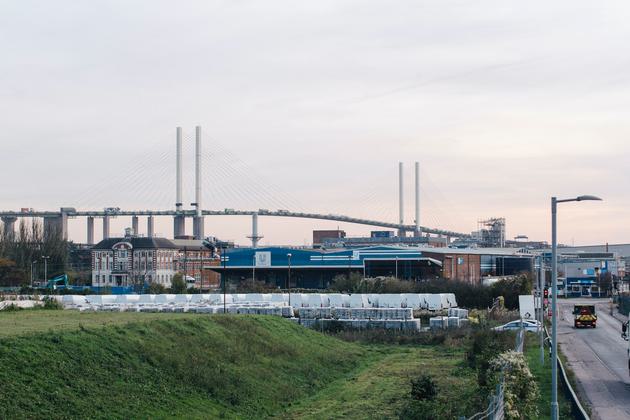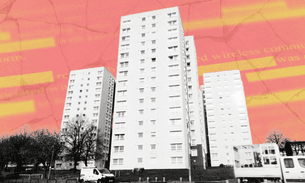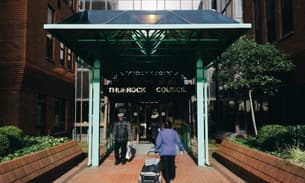
Thurrock council reveals £500m black hole caused by ruinous business deals
The scarcely believable scale of the crisis engulfing Thurrock council has been revealed, with a series of failed investments having left a hole in its budget of almost £500m – the biggest ever reported by a UK local authority.
This funding gap has been disclosed today in a council report that hints at the devastating impact of a scandal uncovered over the last three years by the Bureau of Investigative Journalism. However, the report omits vital details about the deals that got the council into this position.
The budget report shows that four investments made by the Conservative-run council have lost a total of £275m. But it does not disclose the companies involved or how much money went into each deal – details the council has spent years fighting to keep secret.
Despite this, the Bureau can reveal the failed investments behind an eye-watering deficit that is more than three times the council's annual budget.
Most stark is the £655m provided to companies owned by businessman Liam Kavanagh for the purchase of more than 50 solar farms. Earlier this month his company, Toucan Energy Holdings 1, was put into administration. The council repeatedly dismissed concerns raised by our investigation about those deals, even after our story in July revealed that £138m of investment was effectively unaccounted for. According to an internal council document seen by the Bureau, the council expects the deals to lose £188m.
On top of this is £94m tied up in the lender Just Loans Group – a series of investments the council has made no mention of publicly but about which the Bureau has pieced together details from internal documents and public accounts. The company went bust in June with the council as its main creditor. The loss to the taxpayer is estimated to be £65m.
The Bureau newsletter
Subscribe to the Bureau newsletter, and hear when our next story breaks.
The council was also owed £20m it had invested in PWE Holdings to help expand its business supplying eco-friendly generators to leisure centres. Instead, at least £15m was used to set up a credit company. With little prospect of getting its money back, the council recently converted the debt into equity, meaning it now owns a company that lost £3.5m in 2021 and £4.6m in 2020. The recoverable amount from the council’s £20m outlay? Just £1m.
A fourth investment referred to in documents seen by the Bureau as “Allied Care Bond” has resulted in a loss of £1.7m.
The total loss incurred because of these investments is included in the report, but the above details are not.
The significant fall in value of these four deals is only part of the unprecedented financial pressure created by the business model adopted by the council in 2016. Soaring interest costs from having to borrow almost £850m to repay other local authorities and the failure to set aside any of its day-to-day budget to repay its debt – in breach of rules around borrowing – are also major factors.
The report gives little indication of the impact this crisis will have on people who live in the area. The “exceptional financial support” the council will now seek from the government will come at the cost of increased pressure on council budgets and services for more than 20 years. Millions of pounds of assets could be sold, including potentially 10,000 council homes.
John Kent, leader of the council’s Labour group, said: “It’s Thurrock residents that will be paying the price for the Conservatives’ catastrophic handling of the council’s affairs for decades to come.”
The size of the council’s deficit will once again raise questions about systemic issues such as the ease with which it accessed huge sums of money from other public bodies, the failure of auditors to spot problems with the investments and the lack of central funding that led a local authority to take such extreme risks.
Last Friday the council finally disclosed a list of its investments, up to December 2019, to the Bureau following a three-year Freedom of Information battle. The disclosure features most of the deals omitted from today’s report but also includes another previously unknown investment in Chip Chip Ltd, a wood-chipping company, of £14m – all of which was lost after the business went into administration in 2020.
Thurrock has been subject to government intervention since September due to “grave concerns about the exceptional level of financial risk and debt incurred by the council”. Since then commissioners from Essex County Council have been assessing the extent of the financial problems and formulating a recovery plan.
They will be tasked with reversing a financial situation the likes of which few councils have experienced. Thurrock, a relatively small local authority on the commuter belt east of London, has a budget gap this year of £470m. Next year’s deficit is already estimated to be £184m. To put those figures in context, Thurrock’s annual budget is around £150m.
“This is a grave position and at this point the council cannot find a way to finance their expenditure in-year and is unlikely to achieve a balanced budget for 2023/24 without external support,” says the report.
The crisis is the result of an investment strategy that sought to generate extra income at a time when government funding to local authorities was being cut and their ability to raise extra money through traditional means, like increasing council tax, was limited.
The council borrowed £1bn from other local authorities, such as councils and pension funds, and poured the money into a series of business ventures including hundreds of millions into unrated bonds.
The strategy was overseen by Sean Clark, the council’s corporate director of resources, who arranged the investments behind closed doors. Deals worth hundreds of millions of pounds were therefore subject to little or no public or democratic scrutiny and a recent tribunal criticised his “worryingly casual attitude” towards keeping councillors informed of the investments he was making.
 Liam Kavanagh's companies struck deals with Thurrock that are expected to lose the council £188m
Liam Kavanagh's companies struck deals with Thurrock that are expected to lose the council £188m
Some of those investments have since failed spectacularly. Those involving Kavanagh and his companies, which saw the council provide more than half a billion pounds towards the purchase of 53 solar farms, are the most costly examples.
In July the Bureau revealed a series of flaws with the deals, including inadequate due diligence processes and weak security arrangements, and raised serious questions about £138m in top-up investments relating to a portfolio of 32 solar farms. Two years after the last of these payments was made, the council has little idea where that money ended up. Kavanagh has previously said the funds are properly reflected in the balance sheet of his company Toucan Energy Holdings 1. But the company has never filed accounts.
Earlier this month TEH1 went into administration and buyers are now being sought for the sites. The Bureau has seen a document that says the £655m the council is owed by the company will be written down by £188m. In a statement issued through his legal firm Carter Ruck, Kavanagh said he had no role in the management of TEH1.
“I installed a new management team in June 2022 and, as far as I am aware, the underlying business has traded strongly and all interest has been paid in full and on time in accordance with the terms agreed between Thurrock Council and the company,” he said.
“Although I cannot speculate as to the reasons for the company going into administration, if I am approached, I will assist the administrator to achieve the best outcome for the company’s stakeholders.”
Thurrock invested nearly £100m in Just Loans Group, which has been in administration for almost six months. An internal council report, seen by the Bureau, says the council’s money “is not adequately secured, and the security consists of a significant number of risky loans”.
Most of the council’s investment went to Just Loan Group’s subsidiary, Just Cashflow, which continues to trade but showed a loss of £22m in its 2020 accounts, published in September this year. The council’s investment is due to be written down by £65m.
While the report released today does not specifically mention these deals, it does state that the council holds investments with a total value on paper of £1bn. It says that focus since the government intervention has been on “high-value and high-risk” deals, which represent 75% of the council’s portfolio.
It also says the council’s advisers have found that the value of four of its investments “are subject to significant impairment”, which means a permanent reduction in value. The cost of this must then be met by the council’s day-to-day budget. The total reduction in value is currently estimated to be £275m.
Rules around local government borrowing state that a proportion of a council’s revenue budget must be set aside to repay money it has borrowed. Yet the report reveals this did not happen in relation to Thurrock's investments. Rectifying this will cost £129m this financial year and £75m next. It was Clark’s responsibility to make sure these regulations were followed.
There is also a further £33m pressure this year as a result of the lost income from specific deals and the increased costs of borrowing.
The council is in the process of borrowing nearly £850m from the Treasury-run lending body to repay other local authorities that provided the money to fund its investment strategy. Loans it has taken out in the last two months as part of this process have been at rates between 4% and 5%, compared to below 1% for the loans being refinanced.
 John Kent of the council’s Labour group said 'residents will be paying the price for decades to come'
Alex Sturrock for TBIJ
John Kent of the council’s Labour group said 'residents will be paying the price for decades to come'
Alex Sturrock for TBIJ
The report confirms the council will next month apply to the government for what is known as a capitalisation direction, which allows councils to borrow money for day-to-day running costs. Its interim director of finance said in October the council might need far longer than the standard 20 years to repay the loan.
The council said it hoped this emergency support will “provide sufficient time to develop solutions which ultimately fund the financial shortfall”. In the meantime, it will “consider further actions within Thurrock to restrict expenditure, whilst ensuring statutory services and contractual commitments are met”.
Following the government intervention, Thurrock chief executive Lyn Carpenter was placed on extended leave. Sean Clark, who is suspended on full pay, did not respond to requests for comment.
It also led to the resignation of council leader Rob Gledhill. His deputy, Mark Coxshall, who was elected to replace him, said on Tuesday: “These are shocking numbers but the first stage to creating a good plan for recovery is to understand the full extent of the problem.
“I know that Thurrock residents will be concerned and rightly so about what this means for local services. Please rest assured that this report is the first stage of planning for our recovery.”
Despite the massive funding gap, Thurrock has not yet issued a Section 114 notice informing the government that it is unable to balance its budget. The measure, which is as close to bankruptcy as a local authority can get, bans all but essential spending until expenditure can be brought under control.
Croydon issued its third 114 notice in two years earlier this month. As part of that decision the council’s directly elected mayor called on the government to launch a public inquiry into the commercialisation of councils after the failings at authorities like Thurrock.
Despite the Bureau’s investigation, some Thurrock councillors encouraged Clark to borrow and spend even more, with one declaring during a public meeting in June 2020: “The beautiful thing about this plan is that it’s someone else’s money.”
Reporter: Gareth Davies
Bureau Local editor: Emily Wilson
Editor: Meirion Jones
Production editor: Alex Hess
Fact checker: Chrissie Giles
Illustration: Eleanor Shakespeare for TBIJ
Our reporting on local power is part of our Bureau Local project, which has many funders. None of our funders have any influence over our editorial decisions or output.
-
Subject:
-
Area:




